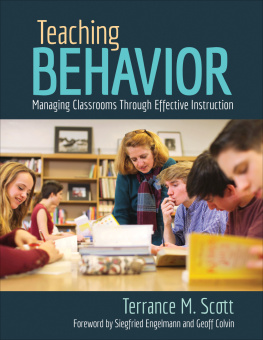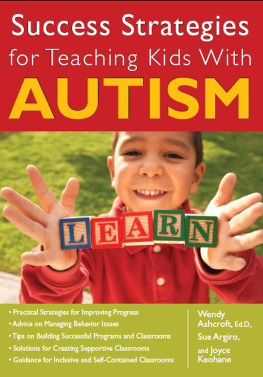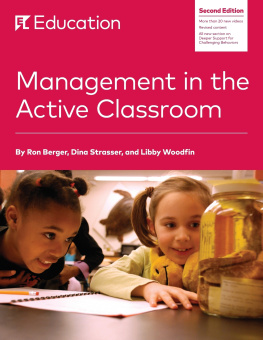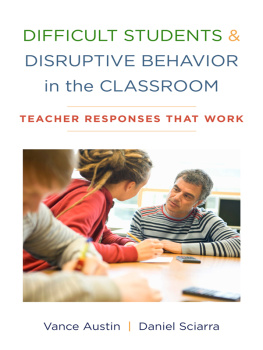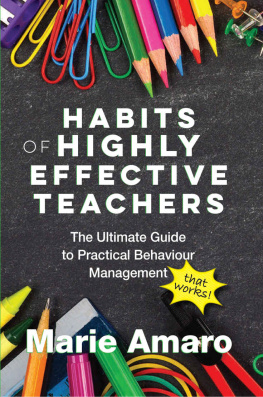MOTIVATING
Defiant &
Disruptive
Students
TO LEARN
To Joy Bach
For the sacrificial hours you spent editing and being a cheerleader and for your selfless commitment to this project.
Thank you.
MOTIVATING
Defiant &
Disruptive
Students
TO LEARN
Positive
Classroom
Management
Strategies
Rich Korb


FOR INFORMATION:
Corwin
A SAGE Company 2455
Teller Road
Thousand Oaks, California 91320
(800) 233-9936
Fax: (800) 417-2466
www.corwin.com
SAGE Ltd.
1 Olivers Yard
55 City Road
London EC1Y 1SP
United Kingdom
SAGE India Pvt. Ltd.
B 1/I 1 Mohan Cooperative Industrial Area
Mathura Road, New Delhi 110 044
India
SAGE Asia-Pacific Pte. Ltd.
33 Pekin Street #02-01
Far East Square
Singapore 048763
Acquisitions Editor: Hudson Perigo
Associate Editor: Allison Scott
Editorial Assistant: Lisa Whitney
Production Editor: Cassandra Margaret Seibel
Copy Editor: Cate Huisman
Typesetter: C&M Digitals (P) Ltd.
Proofreader: Sandy Zilka
Indexer: Joan Shapiro
Cover Designer: Scott Van Atta
Permissions Editor: Adele Hutchinson
Copyright 2012 by Corwin
All rights reserved. When forms and sample documents are included, their use is authorized only by educators, local school sites, and/or noncommercial or nonprofit entities that have purchased the book. Except for that usage, no part of this book may be reproduced or utilized in any form or by any means, electronic or mechanical, including photocopying, recording, or by any information storage and retrieval system, without permission in writing from the publisher.
This book was self-published by the author in 2010.
Printed in the United States of America.
Library of Congress Cataloging-in-Publication Data
Korb, Rich.
Motivating defiant and disruptive students to learn: positive classroom management strategies / Rich Korb.
p. cm.
Includes bibliographical references and index.
ISBN 978-1-4522-0578-6 (pbk.)
1. Classroom management. 2. Problem childrenEducation. 3. Problem childrenBehavior modification. 4. Motivation in education. I. Title.
LB3013.K665 2012 371.1024dc23 2011039018
This book is printed on acid-free paper.
12 13 14 15 16 10 9 8 7 6 5 4 3 2 1
Contents
Preface
M oving from suburban Seattle to the logging communities of southwestern Washington introduced me to the realities of culture shock. How things were done in middle-class America did not always work in rural America. Classroom management was no exception.
On the opening day of elk season, my classroom was occupied by only female students. Frustrated, angry, and thinking the students were playing a prank, I asked the girls where the boys were. They acted like I was from another planet. I suppose in a way I was, as the students called me City Boy. Apparently the school board had a policy that excused boys to go hunting on opening day. My position on school attendance is that school comes first, unless you physically cannot get out of bed. I quickly learned that to survive, I was the one who needed to conform to the standards established by the local school board. I also learned to be creative within the limits of state law, school board policy, and building administration.
As the first year grew into 34 years, I found methods for working with the most challenging and difficult students. During my second year, a youngster named Chuck was enrolled in the keyboarding class I was teaching. Chuck was defiant, disruptive, and disrespectful to anyone he thought did not respect him. Chuck and I sat down and came up with a plan for him to pass the class. We were fortunate to have two classrooms separated by a full set of windows and a door. Chuck would get one room to himself, while I taught in the other. We agreed that he would complete his daily assignment during the class period; that he could walk around when he needed to, look out the window, and join the class if he sat and worked; and that he would not leave the classroom without permission. Chuck never rejoined the class, but he was never defiant, disruptive, or disrespectful with me. He did all of his assignments and passed the class.
Throughout my career I have always found a way to get on the same page with challenging students. Gaining a students trust is the first step toward successful interventions.
Outlined within these pages are precepts that I have catalogued over the past 34 years as a teacher, administrator, and national presenter. These strategies will work if approached with a willing mind and compassionate heart for each student. This methodology in classroom management can be applied immediately in your classroom or building.
Throughout our journey of the strategies listed within these pages, you will notice references to our team. As in any work it takes a team and they need to be recognized as such. Join us in our tour of working with difficult students.
Enjoy the journey on your road to successful student management, and may you become encouraged and reenergized to work with challenging students.
Acknowledgments
M y personal thanks are given to the many friends, teachers, and thousands of students who have contributed directly or indirectly to the strategies, methods, precepts, and ideas incorporated within these pages.
To my good friend and excellent writer John Trumbo, for his encouragement and storytelling approach, which caused this project to come to lifethanks a ton.
To my son David, for his hours of layout, presentation preparation, and technical supportyou are my hero.
This book would not have been possible without this fine group of dedicated individuals.
Publishers Acknowledgments
Corwin would like to thank the following individuals for taking the time to provide their editorial insight:
Rachel Aherns
Sixth Grade Science Teacher
Westridge Elementary School
West Des Moines Community School District
West Des Moines, IA
Dr. Melissa Albright, NBCT
Fifth Grade Communication Arts Teacher
Wilsons Creek School
Springfield Public Schools
Battlefield, MO
Neil MacNeill
Principal
Ellenbrook Primary School
Ellenbrook, Western Australia
Michelle Strom, NBCT
Middle School Language Arts Teacher
Fort Riley Middle School
Fort Riley, KS
About the Author

Rich Korb has 34 years of experience as a successful educator and consultant working with difficult and at-risk students. He has taught both general and special education at all levels and has served as director of education at a ranch for delinquent youth.
His experience in working with difficult and defiant students has led him to develop a wealth of practical ideas that teachers and administrators can put to use immediately. He knows what works and what doesnt work when dealing with disruptive and defiant students.
Rich is a sought-after presenter and the author of Accelerating Achieve ment Through Purposeful Assessment as well as the current work. He is also an adjunct faculty member for Seattle Pacific University and Brandman University, Chapman University Systems, where he teaches a course in how to work with defiant and disruptive students.
Next page


